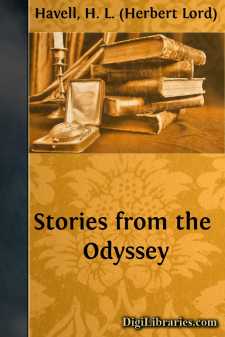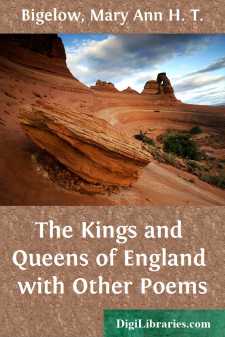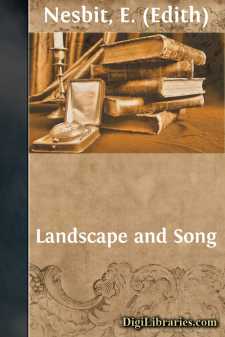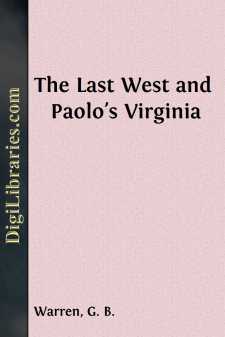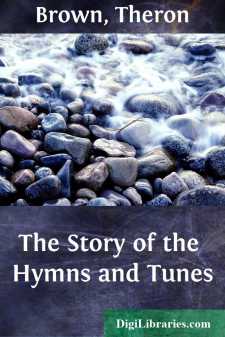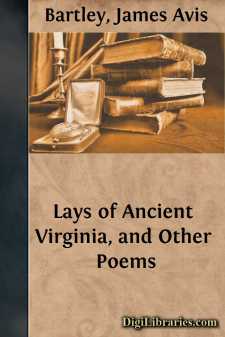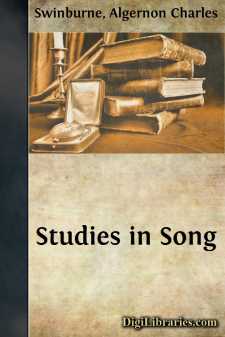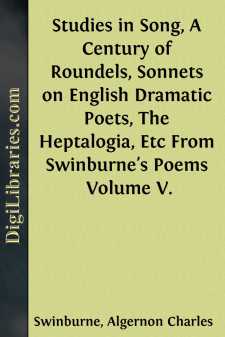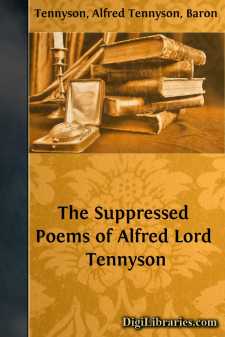Poetry Books
Sort by:
INTRODUCTION The impersonal character of the Homeric poems has left us entirely in the dark as to the birthplace, the history, and the date, of their author. So complete is the darkness which surrounds the name of Homer that his very existence has been disputed, and his works have been declared to be an ingenious compilation, drawn from the productions of a multitude of singers. It is not my intention...
more...
The Kings and Queens of England, From the Battle of Hastings or the Norman Conquest, to the Present Reign, Inclusive. First, William the Norman lays claim to the crown And retains it till death; then follows his son The red headed William, whose life is cut short By a shot from his friend, when hunting for sport. Then Henry his brother takes quiet possession, As Henry the first, of the great English...
more...
LONDON:HENRY J. DRANE & CO.Paternoster Row E.C. New York: E.P. Dutton & Co. I. What dreams the flower cups enfold Within their fragrant leaves, Of meadow-ways grown fair with spring, Soft mists that April...
more...
by:
G. B. Warren
Author's Introduction To you who have lifted the veil of mists o'er-blown And gazed in the eyes of dawn when night had flown— Have felt in your hearts a thrill of sheer delight As you scanned the scene below from some alpine height— I extend this fleeting glimpse across a world Of forest and meadow land—at last unfurled— Through vistas of soaring peaks with...
more...
by:
E. Stuart Hardy
Laugh and Play. Laughand play all the day:Don't you think with meWhen I say that's the wayIf you'd happy be?Maid and lad, if we hadNever time for song,Always sad, never glad,Days would seem so long!Tear and sigh make the skyDark and sad and grey;Never cry—only tryJust to laugh and play.Faces bright make sunlightAll the merry day;Frowns they fright out of sight—So we'll...
more...
by:
Theron Brown
INTRODUCTION. Augustine defines a hymn as “praise to God with song,” and another writer calls hymn-singing “a devotional approach to God in our emotions,”—which of course applies to both the words and the music. This religious emotion, reverently acknowledging the Divine Being in song, is a constant element, and wherever felt it makes the song a worship, irrespective of sect or creed. An...
more...
POCAHONTAS.Where yonder moss-grown ruinlonely stands,Which from the James, the Pilgrim may survey,Stretch alway forth its old, forsaken handsAs if to beg some friend its fall to stay,And now the wild vine flaunts in greenness gay;Erst rose a Castle, known to deathless fame,Though now the mournful rampart falls away,Hither Virginia's hero-father came,To found a glorious state, and give these...
more...
SONG FOR THE CENTENARY OF WALTER SAVAGE LANDOR. 1. Five years beyond an hundred years have seenTheir winters, white as faith's and age's hue,Melt, smiling through brief tears that broke between,And hope's young conquering colours reared anew,Since, on the day whose edge for kings made keenSmote sharper once than ever storm-wind blew,A head predestined for the girdling greenThat laughs at...
more...
ATHENS AN ODEEre from under earth again like fire the violet kindle,[Str. 1. Ere the holy buds and hoar on olive-branches bloom,Ere the crescent of the last pale month of winter dwindle,Shrink, and fall as falls a dead leaf on the dead month's tomb,Round the hills whose heights the first-born olive-blossom brightened,Round the city brow-bound once with violets like a bride,Up from under earth...
more...
Timbuctoo A POEMWHICH OBTAINEDTHE CHANCELLOR'S MEDALAT THE Cambridge Commencement MDCCCXXIX BYA. TENNYSON Of Trinity College [Printed in Cambridge Chronicle and Journal of Friday, July 10, 1829, and at the University Press by James Smith, among the Prolusiones Academicæ Præmiis annuis dignatæ et in Curia Cantabrigiensi Recitatæ Comitiis Maximis, MDCCCXXIX. Republished in Cambridge Prize Poems,...
more...


